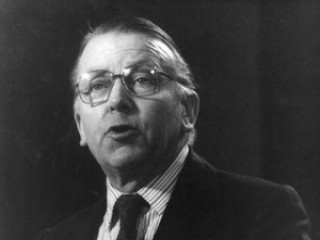
Francis Pym biography
Date of birth : 1922-02-13
Date of death : 2008-03-07
Birthplace : Abergavenny, Monmouth County, Wales
Nationality : British
Category : Politics
Last modified : 2011-05-05
Credited as : Politician, foreign secretary , Margaret Thatcher
The British statesman Francis Pym was foreign secretary during the Falkland Islands War of 1982.
Francis Leslie Pym was born on February 13, 1922, in Abergavenny, Monmouth County, Wales, into a family that had provided political leaders to Britain for centuries. One of his ancestors was John Pym, a leader of the parliamentary cause in the 17th-century civil war. When he entered the House of Commons for the first time in 1961, representing a Cambridgeshire district where his family had long been prominent, he was the fifth Pym to serve his country there. His father, Leslie Ruthven Pym, was a member of Parliament who became Conservative Party whip as well as a wealthy real estate broker.
Brought up in a privileged background, Pym was educated at the traditional training grounds for the nation's ruling elite, Eton College, and at Magdalene College of Cambridge University. He entered the army in 1942 and served with distinction as an officer in the Royal Lancers in Italy and North Africa. After returning to civilian life in 1946, he entered the business world working for a department store chain in Birmingham and Liverpool. He married Valerie Fortune Daglish in 1949, and they had two sons and two daughters. In 1959 he entered politics, contesting Rhonda West as a Conservative, but he was defeated.
In 1961 he won his election from Cambridgeshire, beginning a parliamentary career that made him one of the most respected Conservatives of his era. He quickly gained office as assistant government whip from 1962 to 1964, and when the Labour Party ousted the Conservatives in 1964 Pym became an opposition whip (1964-1967) and then deputy chief whip for the opposition (1967-1970). An able parliamentarian with a talent for compromise, Pym was well placed to assume office when the Conservatives returned to power in 1970. Prime Minister Edward Heath chose him as parliamentary secretary to the treasury and government chief whip. He was in effect the floor manager for the government in the House of Commons, lining up the votes which the prime minister needed to get his programs enacted.
Pym found an assignment which not only tested his skills but also allowed him to work for something he strongly believed in—British entry into the European Economic Community (European Union). This was an issue which cut across party lines, and Pym managed to get the votes for passage. He had less success in his next assignment, as secretary of state for Northern Ireland from 1973 until the Heath government fell in 1974. In opposition again, Pym became his party's spokesman first on agriculture and then on Commons affairs and devolution (1976-1978) and foreign and commonwealth affairs (1978-1979).
Although Pym represented the more moderate and traditional wing of his party, he won the support of the right-winger who became Conservative leader in 1975, Margaret Thatcher. When she took office in 1979, Pym was passed over for foreign secretary, but he did win the position of secretary of state for defense. Thatcher's plans to cut back Britain's defense budget left Pym ill at ease and eventually led to his leaving the Defense Ministry in 1981 to become the leader of the House of Commons as well as chancellor of the duchy of Lancaster. In 1982, when the Falkland Islands War with Argentina began and Lord Carrington, the foreign secretary, was blamed for not heading off the trouble, Thatcher asked Pym to replace him.
As foreign secretary Pym not only had to deal with the Falklands and serve as a member of the prime minister's war cabinet, directing the conduct of the campaign, but he also had to handle a tense situation regarding Britain's contributions to the European Common Market. Thatcher gained immense public support for her role as a war leader, and as she headed towards a sweeping reelection victory in 1983 it became obvious that she intended to replace Pym with someone who represented her own kind of conservatism. During the elections Pym made a widely quoted comment that huge majorities were not good for governments. The prime minister publicly criticized him for this. When she won she dropped Pym from her government.
Pym was then free to speak his mind as an independent, and he began to elaborate on his criticisms of Thatcherism in 1984. He had always felt uneasy about the prime minister's monetarist economic policies which led to unemployment and what he felt caused unneeded suffering among the poor. In his speeches and in his book The Politics of Consent Pym explained why Thatcher's combative policies were at odds with the true Conservative approach. Pym's book gained support with some, while others claimed that it merely glossed over important topics—long on rhetoric and providing little substance. In May 1985, Pym launched an anti-Thatcher movement within the Conservative Party, the "Conservative Centre Forward, " but this failed to attract the support of leading members of the party and was given little chance of success. In fact, Thatcher swept to an easy reelection victory in 1987, taking 43 percent of the vote in a three-party race. While his attempts to revamp the Conservative Party eventually fizzled, Pym accepted a peerage in 1987 for his lifetime service to his country, and was given the title Baron Francis Leslie Pym of Sandy.
Pym's book The Politics of Consent (1984) provides the best insights into his thinking. He is discussed in Alan Sked and Chris Cook, Post-War Britain, A Political History (1984), and in Peter Riddell, The Thatcher Government (1983).


















